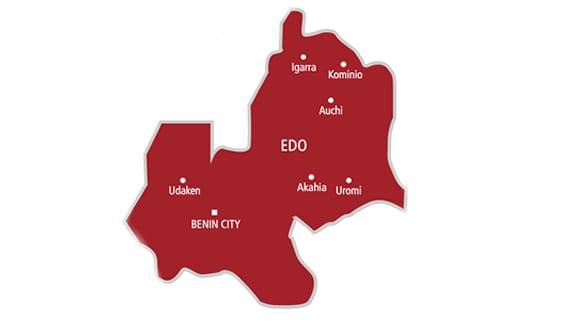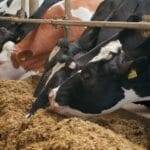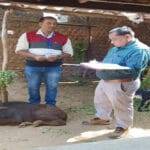Main Points In Hindi (मुख्य बातें – हिंदी में)
-
चावल सशक्तिकरण कार्यक्रम का शुभारंभ: नाइजर डेल्टा डेवलपमेंट कमीशन (एनडीडीसी) के प्रबंध निदेशक, सैमुअल ओगबुकु द्वारा एडो राज्य के ओवान पूर्व स्थानीय सरकारी क्षेत्र में चावल की फसल को हरी झंडी दिखाते हुए कार्यक्रम का शुभारंभ किया गया है।
-
कृषि विकास की प्रतिबद्धता: ओगबुकु ने बताया कि आयोग चावल और कसावा सशक्तिकरण कार्यक्रम के माध्यम से नाइजर डेल्टा राज्यों में कृषि विकास को पुनर्जीवित करने के लिए प्रतिबद्ध है।
-
उच्च कृषि विज्ञान पद्धतियों का अपनाना: फसल की सफलता का श्रेय अच्छी कृषि विज्ञान पद्धतियों और पूर्ण मशीनीकरण को दिया गया है, जिससे यह सुनिश्चित हुआ कि खेत की तैयारी से लेकर फसल तक सभी प्रक्रियाएं सुचारू रूप से चलें।
-
स्थायी और आत्मनिर्भर कार्यक्रम: आयोग ने कार्यक्रम को इस प्रकार डिजाइन किया है कि यह न केवल आत्मनिर्भर होगा, बल्कि वित्तीय संस्थानों और अन्य भागीदारों को नए समुदायों और किसानों तक पहुंचने के लिए भी आकर्षित करेगा।
- अन्य राज्यों में विस्तारण की योजना: आयोग ने अक्वा इबोम और नदी राज्यों में भी इसी तरह के चावल सशक्तिकरण कार्यक्रमों का उल्लेख किया है, जो जल्द ही फसल के लिए तैयार होंगे।
Main Points In English(मुख्य बातें – अंग्रेज़ी में)
Here are the main points from the article regarding the Niger Delta Development Commission (NDDC) and its activities related to rice and cassava empowerment programs:
-
Launch of Rice Cultivation: Samuel Ogbuku, the Managing Director of NDDC, inaugurated the rice cultivation under the rice and cassava empowerment program in Owan East Local Government Area, Edo State, emphasizing the commission’s commitment to revitalize agricultural development in the Niger Delta states.
-
Significance of the Event: Ogbuku characterized the inaugural rice harvest as a significant milestone in the history of the commission’s agricultural programs, reflecting on the lessons learned for continuous improvement.
-
Collaboration and Achievements: The event was viewed as a collective success, with well-prepared land and the adoption of mechanization leading to fruitful agricultural practices. The program is designed to attract financial institutions and partners for further community and farmer engagement.
-
Future Expansion Plans: The NDDC is also planning similar rice empowerment programs in Akwa Ibom and Rivers States, indicating ongoing efforts to enhance agricultural productivity and sustainability across the region.
- Challenges and Outcomes: Despite preparing 98 hectares of land, delays in planting caused only 50 hectares to be sown, resulting in an estimated yield of three tons per hectare on the remaining 25 hectares. Measures are being implemented to improve irrigation and increase future yields.


Complete News In Hindi(पूरी खबर – हिंदी में)
नाइजर डेल्टा डेवलपमेंट कमीशन (एनडीडीसी) के प्रबंध निदेशक, सैमुअल ओगबुकु ने एडो राज्य के ओवान पूर्व स्थानीय सरकारी क्षेत्र, वार्रेके में आयोग के चावल और कसावा सशक्तिकरण कार्यक्रम क्षेत्र में चावल की फसल को हरी झंडी दिखाई है।
उन्होंने कहा कि आयोग चावल और कसावा सशक्तिकरण कार्यक्रम के माध्यम से नाइजर डेल्टा राज्यों में कृषि विकास को पुनर्जीवित करने के लिए प्रतिबद्ध है, जिसमें महत्वपूर्ण फसल दर्ज की गई है।
बोलते हुए, ओग्बुकु ने कहा कि उद्घाटन फसल नाइजर डेल्टा में आयोग के कृषि कार्यक्रमों के इतिहास में एक महत्वपूर्ण दिन था।
प्रायोजक विज्ञापन
एनडीडीसी में कृषि और मत्स्य पालन निदेशक, डॉ. विनीफ्रेड मैडूम द्वारा प्रतिनिधित्व करते हुए, ओगबुकु ने फसल को एक संयुक्त उपलब्धि के रूप में वर्णित किया।
उनके अनुसार, खेत की सर्वांगीण सफलता और भूमि की तैयारी से लेकर फसल तक पूर्ण मशीनीकरण को अपनाने का कारण अच्छी कृषि विज्ञान पद्धति को अपनाना था।
“इस उद्घाटन फार्म और वर्तमान में विभिन्न चरणों में मौजूद अन्य फार्मों से सीखा गया सबक निरंतर सुधार में हमारे प्रयासों का समर्थन करेगा।
“जून में ऑनबोर्डिंग कार्यक्रम के दौरान, हमने सभी को आश्वासन दिया कि यह कार्यक्रम सफल होगा। आज, यह फसल उस यात्रा में एक मील के पत्थर के रूप में काम करती है जो अभी पूरी नहीं हुई है, लेकिन निश्चित रूप से एक मजबूत आधार पर आगे बढ़ी है, ”ओगबुकु ने कहा।
उन्होंने कहा कि आयोग के पास अक्वा इबोम और नदी राज्यों में भी इसी तरह के चावल सशक्तिकरण कार्यक्रम हैं जो जल्द ही फसल के लिए तैयार होंगे।
ओग्बुकु ने बताया कि आयोग ने कार्यक्रम को इस तरह से डिजाइन किया है कि यह न केवल आत्मनिर्भर होगा बल्कि इसकी सफलता वित्तीय संस्थानों और अन्य भागीदारों को अधिक समुदायों और किसानों तक पहुंचने के लिए विस्तार में शामिल होने के लिए आकर्षित करेगी।
उन्होंने वार्रेक समुदाय के नेतृत्व को न केवल खेती के लिए उपलब्ध कराई गई भूमि के लिए धन्यवाद दिया, बल्कि परियोजना की सफलता के लिए प्रदान किए गए सक्षम वातावरण के लिए भी धन्यवाद दिया।
उन्होंने चयनित समुदायों को आश्वासन दिया जहां कार्यक्रम अभी तक शुरू नहीं हुआ है, कि परियोजना न केवल उनके समुदायों तक आएगी बल्कि शुरू होने के बाद भी कायम रहेगी।
साथ ही बोलते हुए, परियोजना के सलाहकार, वॉन केनेथ डिमियारी ने कहा कि किसानों ने 98 हेक्टेयर भूमि तैयार की, लेकिन देर से रोपण के कारण 50 हेक्टेयर में बुआई की।
“हमने 50 हेक्टेयर फ़ारो चावल लगाया लेकिन सूखे के परिणामस्वरूप, 25 हेक्टेयर नहीं बचा और 25 हेक्टेयर बच गया।
उन्होंने कहा, “जो 25 हेक्टेयर जमीन बची है, उसमें से हम प्रति हेक्टेयर तीन टन उपज का अनुमान लगा रहे हैं।”
उन्होंने कहा कि फार्म को इस तरह से संरचित किया गया है कि फसल का एक हिस्सा किसानों के पास जाएगा जबकि दूसरे हिस्से का उपयोग प्रक्रिया को दोहराने के लिए किया जाएगा क्योंकि रोपण जारी रहेगा।
उन्होंने फसल में कम गिरावट के लिए देर से रोपण को जिम्मेदार ठहराया, जिससे उन्होंने खेत के कुछ हिस्सों को प्रभावित किया, उन्होंने कहा कि एडो राज्य में डेल्टा, नदी और अक्वा इबोम राज्यों की तरह अधिक वर्षा नहीं होती है।
“अक्वा इबोम में, हमने 50 हेक्टेयर से शुरुआत की और पिछले महीने, हमने अतिरिक्त 60 हेक्टेयर रोपण किया। हम खेतों में सिंचाई पंप स्थापित करेंगे और उम्मीद है कि दिसंबर की शुरुआत तक हम कटाई शुरू कर देंगे, ”उन्होंने कहा।
Complete News In English(पूरी खबर – अंग्रेज़ी में)
The Managing Director of the Niger Delta Development Commission (NDDC), Samuel Ogbuku, recently inaugurated a rice crop under the commission’s Rice and Cassava Empowerment Program in Warrake, located in the Owan East local government area of Edo State.
He expressed the commission’s commitment to revitalizing agricultural development across the Niger Delta states through this program, highlighting the significance of rice as a key crop. Ogbuku considered the crop inauguration a historic day for agricultural initiatives in the Niger Delta.
Representing the NDDC’s Director of Agriculture and Fisheries, Dr. Winifred Madu, Ogbuku described the harvest as a collective achievement. He attributed the farm’s success to the adoption of advanced agricultural practices, including full mechanization from land preparation to harvesting.


Ogbuku noted that lessons learned from this inaugural farm and other farms currently in various stages will support continuous improvements in their efforts. He mentioned that the program commenced with a guarantee of success and that this harvest marks a milestone on their ongoing journey, which is founded on strong principles.
He added that similar rice empowerment programs are also being planned in Akwa Ibom and Rivers states, which will soon be ready for planting. The commission designed the program to be self-sustaining and to attract financial institutions and partners for expansion to more communities and farmers.
Ogbuku thanked the Warrake community’s leaders for providing land for farming and for creating a conducive environment for the project’s success. He assured other selected communities, where the program has yet to be launched, that it will reach them and will remain long-term once it begins.
Consultant to the project, Von Kenneth Dimiyari, shared that farmers prepared 98 hectares of land but were only able to plant on 50 hectares due to delays. He noted that they planted Faro rice on 50 hectares and, due to drought, only half of that area (25 hectares) survived, estimating a yield of three tons per hectare from the surviving land.
Dimiyari explained that the farm is structured so that part of the crop goes to the farmers while another part is used for future planting. He also blamed the late planting for lower crop yield due to reduced rainfall in Edo State compared to Delta, Rivers, and Akwa Ibom states.
He added that in Akwa Ibom, they started with 50 hectares and recently planted an additional 60 hectares. They plan to install irrigation pumps in the fields and expect to begin harvesting by early December.
Source link








